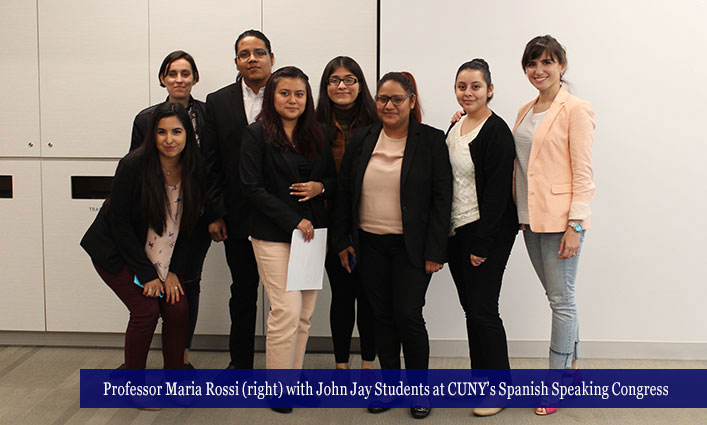
Sometimes stepping out of your comfort zone can have a big payoff. And, that’s exactly what Assistant Professor María Julia Rossi’s students found out after attending and speaking at the first CUNY Spanish Students’ Congress on May 5th. “Public presentations, such as symposiums and conferences, are a very important part of our profession as scholars,” says Rossi, who teaches in the Department of Modern Languages and Literatures. “It matters when you’re seeking a job or starting your career as a scholar. I really wanted my students to benefit from this experience.” After persuading her students to use their Spanish speaking skills at the symposium, Rossi was pleasantly surprised with their extremely professional presentations. We spoke with a few of them to learn more about their symposium experience and subsequent scholarship win.
“We practiced a lot before the event. And, they made a lot of mistakes during practice. But at the symposium, not a single mistake, just professional presentations that impressed everyone there.” —Assistant Professor Maria Julia Rossi, Department of Modern Languages and Literatures
The CUNY Spanish Students’ Congress
At the symposium Melanie Chiluisa, a junior double majoring in Criminology and Spanish Latin American Literatures and Cultures, presented a story she wrote herself titled “Christina.” “The piece was influenced by my own experiences with my parents’ divorce. I just made a few adjustments to dramatize it more, but I kept it realistic,” says Chiluisa. “I had translated the piece from English to Spanish, and while I was reading the story, all I could think about was not messing up, not stuttering, and just getting through each page.”
Byron Sandoval, a junior majoring in Computer Science and Information Security, also presented his own writing in Spanish at the congress. “The story is called ‘Ouroboros’ and it’s about a girl that recounts various events that happened in a fictional Latin American town,” says Sandoval. “Reading my story, I was nervous at first. I had never presented something as personal as my short stories to anyone other than my professor before. But after I went through the first page, I felt very calm and excited to be in the moment.”
After all of her students presented at the congress, Rossi couldn’t conceal her pride. “We practiced a lot before the event. And they made a lot of mistakes during practice,” says Rossi. “But at the symposium, not a single mistake, just professional presentations that impressed everyone there.”
“Reading my story, I was nervous at first. I had never presented something as personal as my short stories to anyone other than my professor before. But after I went through the first page, I felt very calm and excited to be in the moment.”— Byron Sandoval (’20)
The Scholarship Possibilities
After the success at the CUNY Spanish Students’ Congress, Rossi suggested that her students apply for the Undergraduate Research/ Creativity Assistant Scholarship. Initially, many of them didn’t think they could apply because their work was fiction writing. But Rossi explained that fiction writing was just as scholarly as any other work, and pushed them out of their comfort zones once again. Both Chiluisa and Sandoval applied and won $1,000 for research on their work. “I was already working on other short stories, and the idea to expand the compilation to Salvadoran literature came up because of this scholarship,” says Sandoval.
The Work Ahead
Now that he has won the scholarship, Sandoval plans on doing research inspired by his original short story. “I plan to do two-fold work. I will keep writing short stories similar to ‘Ouroboros,’ and the second part will be a study through an aesthetic of Salvadoran writers,” says Sandoval.
“One of the biggest obstacles to achieving something is your own doubts—doubting yourself and your writing. But without taking the risks, how would you know if you’re any good?”—Byron Sandoval (’20)
Also influenced by the piece she presented at the symposium, Chiluisa is planning on writing fictional short stories that she’ll translate from English to Spanish. “Similar to the process I used for the symposium, I want to translate these pieces into Spanish. The results from these auto-translations can show the obstacles faced by Latin American self-translators. It’s an underrepresented field, and I want to know why,” says Chiluisa.
The entire experience helped the students realize that sometimes it’s important to push past your fears and be confident in your work and in yourself. “One of the biggest obstacles to achievement is your own doubts—doubting yourself and your writing,” says Sandoval. “But without taking the risks, how would you know if you’re any good?”



